Candidates to replace Corbyn denounce him as anti-Semitic
 |
| Asa Winstanley 15 February 2020 |
Candidates to replace Jeremy Corbyn as UK Labour leader this week denounced his words as “anti-Semitic.”
Israel lobby groups the Jewish Labour Movement and Labour Friends of Israel held a joint event on Thursday night to grill the leadership contenders.
Rebecca Long-Bailey, the supposedly left-wing candidate to replace Corbyn, agreed it was “anti-Semitic” to “describe Israel, its policies, or the circumstances around its foundation as racist.”
Lisa Nandy, another candidate, agreed with even more enthusiasm.
In 1948, Israel expelled 800,000 Palestinians from Palestine.
In 2018, Corbyn stated that it should not be “regarded as anti-Semitic to describe Israel, its policies or the circumstances around its foundation as racist because of their discriminatory impact” on Palestinians.
He had been attempting unsuccessfully to make it Labour Party policy to protect people who make valid criticisms of Israel, or state historical facts, from allegations of anti-Semitism.
But on Thursday, to loud groans from the audience, Long-Bailey prevaricated that she couldn’t “remember the exact words” Corbyn had used after the moderator – TV journalist Robert Peston – revealed the words she had just agreed were anti-Semitic were in fact Corbyn’s.
Peston ranted that Corbyn’s words had been “a disgrace.”
Festival of reaction
Long-Bailey has touted herself as the left-wing successor to Corbyn.
But there are no signs of anything like the same grassroots enthusiasm for her as there was for Corbyn.
The event on Thursday night was a festival of reaction and ignorance.
All four candidates tried to outdo each other in touting their pro-Israel credentials, and competing about who would expel the most Labour Party members in an ongoing “anti-Semitism” witch hunt.
Emily Thornberry posted – but later deleted – a shamelessly anti-Palestinian tweet that same night. The posting clearly implied it was “anti-Semitic” for Labour conference delegates to fly Palestinian flags.
Neither Thornberry nor the Labour Party replied to requests for comment.
Asked by one questioner what their attitude was towards Zionism, all four leadership candidates expressed support for Israel’s official ideology.
“I believe in the state of Israel and therefore I’m a Zionist,” said Thornberry.
Nandy was even more enthusiastic, gushing about what “makes me a Zionist.”
Long-Bailey said she supported separate Palestinian and Israeli states, “So I suppose that makes me a Zionist, because I agree with Israel’s right to exist.”
Keir Starmer, the frontrunner, said that he has family in Israel and although “I wouldn’t describe myself in that way,” he understood “and I sympathize with and I support Zionism.”
Racism
Zionism is the movement that founded the state of Israel in 1948, and remains enshrined in Israeli law and state ideology today.
Between 1947 and 1949, Zionist militias and the new Israeli army drove the majority of Palestine’s indigenous population out of the country in order to create a majority Jewish state.
The refugees have never been allowed to return solely because they are not Jewish.
The Jewish Labour Movement and Labour Friends of Israel audience were openly hostile to Corbyn on Thursday night.
During the introduction, Jewish Labour Movement chair Mike Katz asked why Labour had supposedly become a home for “anti-Semites” and “Holocuast deniers.”
Someone in the audience shouted out “Corbyn!” to warm laughter from the audience.
The morning after the event, the Jewish Labour Movement announced its members had endorsed Lisa Nandy for Labour leader.
This endorsement is unlikely to influence the wider membership, however.
A YouGov poll of party members last month showed that Labour Friends of Israel – which co-hosted the event Thursday night – is now the single most unpopular out of nine Labour-associated groups.
Only 17 percent of members polled said they viewed the Israel lobby group favorably, with 38 percent regarding it unfavorably.
By contrast, Labour Friends of Palestine is viewed favorably by 47 percent of party members and unfavorably by just 12 percent.
That gives Labour Friends of Palestine a net favorability rating of 35, while Labour Friends of Israel’s stands at -21.


